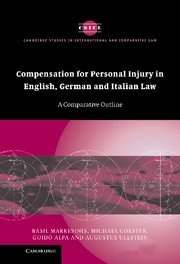Book contents
- Frontmatter
- Contents
- Foreword
- Preface
- Table of cases
- List of Abbreviations
- 1 Introduction
- 2 General damages: non-pecuniary losses
- 3 Special damages: past losses
- 4 Future pecuniary losses
- 5 Collateral sources of revenue: subrogation rights and miscellaneous matters
- 6 Conclusions
- Appendix: Comparative tables on the evaluation of physical injury (IP) for micro-permanent injuries
- Index
- CAMBRIDGE STUDIES IN INTERNATIONAL AND COMPARATIVE LAW
3 - Special damages: past losses
Published online by Cambridge University Press: 02 July 2009
- Frontmatter
- Contents
- Foreword
- Preface
- Table of cases
- List of Abbreviations
- 1 Introduction
- 2 General damages: non-pecuniary losses
- 3 Special damages: past losses
- 4 Future pecuniary losses
- 5 Collateral sources of revenue: subrogation rights and miscellaneous matters
- 6 Conclusions
- Appendix: Comparative tables on the evaluation of physical injury (IP) for micro-permanent injuries
- Index
- CAMBRIDGE STUDIES IN INTERNATIONAL AND COMPARATIVE LAW
Summary
English law
Introduction
In English law the expression ‘special damages’ can, as we stated in the Introduction, have several meanings. In this chapter it refers to the amounts payable by a tortfeasor to his victim for the pecuniary losses actually suffered between the date of the accident and the date of trial or, in the case of less serious injury, the date of recovery. Thus the basic principle is that the claimant must prove, on the balance of probabilities, either what he has lost in financial terms (as for example in loss of earnings), or what sums he has had to pay, or become liable to pay, in order to meet expenditure directly incurred as a consequence of his injuries.
It is not, of course, every penny expended which is recoverable as damages. The court will look to see whether those payments were reasonably necessary. The principle was explained by Megaw LJ in Donnelly v. Joyce. While the claimant may say, and believe, that it would aid his recovery to travel in the style and comfort of a Rolls Royce motor car and to spend an extended holiday in a five-star hotel in the Caribbean, the court is most unlikely to accept that it was reasonably necessary for him to do so. However, judges are disinclined, where the matter is marginal, to say that it was unreasonable for the claimant to have taken a certain course if he has actually expended the money.
- Type
- Chapter
- Information
- Compensation for Personal Injury in English, German and Italian LawA Comparative Outline, pp. 97 - 115Publisher: Cambridge University PressPrint publication year: 2005



